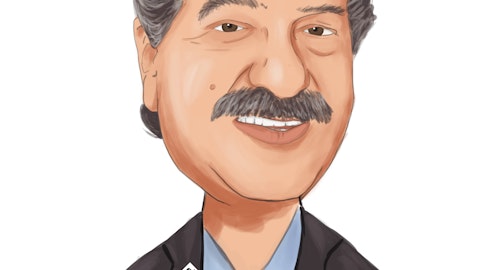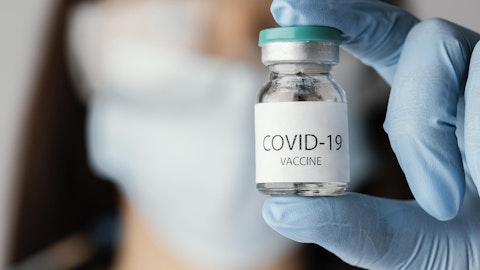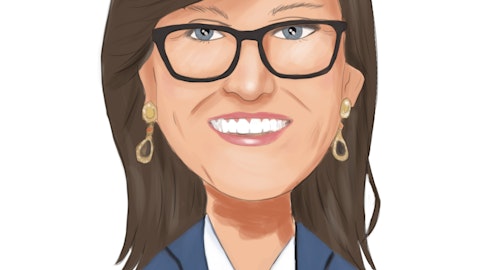Bronte Capital, an investment management firm, published its “Amalthea Fund” second quarter 2021 investor letter – a copy of which can be downloaded here. A return of 6.50% was delivered by the fund for the second quarter of 2021, compared to the diversified ACWI global index (in $A) that delivered a +9.11% return for the same period. You can take a look at the fund’s top 5 holdings to have an idea about their top bets for 2021.
In the Q2 2021 investor letter of Bronte Capital, the fund mentioned Regeneron Pharmaceuticals, Inc. (NASDAQ: REGN), and discussed its stance on the firm. Regeneron Pharmaceuticals, Inc. is a Tarrytown, New York-based biotechnology company with a $71.7 billion market capitalization. REGN delivered a 38.85% return since the beginning of the year, while its 12-month returns are up by 11.32%. The stock closed at $665.77 per share on August 26, 2021.
Here is what Bronte Capital has to say about Regeneron Pharmaceuticals, Inc. in its Q2 2021 investor letter:
“Regeneron is a large and successful biotech company whose revenue is largely dependent on one drug (Eylea) whose exclusivity runs out in 2024-25.
Eylea is a treatment for wet macular degeneration, the most common cause of blindness in old people. It cannot cure blindness, but it can, with monthly injections, stop eyesight deteriorating. These monthly injections are alas in the eye which sounds worse than it is. (There are no nerve endings, so it is frightening but painless.)
Blindness has very nasty social and economic consequences. Large avoided-costs (the cost of looking after blind old people) allows Regeneron to charge a lot for Eylea. Eylea is – for example – the biggest single draw on the Australian Pharmaceutical Benefits Scheme. The relatively short-dated patent for Eylea is the reason Regeneron trades at a low earnings multiple. (It is roughly 10-12 times earnings at the price we bought it.) But it is not for Eylea you own Regeneron. The real reason for owning the stock is the platform that Regeneron has in mouse genetics.
Regeneron has a process for rapidly and accurately genetically modifying mice. They have mice that have, for instance, largely human immune systems. Humanized mice sound like science fiction, but we assure you that they are commonplace now and there are thousands of different variants.
Humanized mice are profoundly useful in drug development. For instance, you can give humanized mice COVID-19 and you can find the mice that are preferentially good at fighting the disease. What this means is that the mice develop antibodies which are key to fighting disease. And as these are humanized mice they are (with minor caveats) effectively human antibodies.
The company then has to find the cells that produce those antibodies, clone those cells into Chinese hamster ovary cells (a standard stem cell line) and mass produce the antibodies as drugs.
These drugs – on the evidence so far – work pretty well. The “experimental” COVID drug that was given to Donald Trump when he was very sick was developed this way. When the former President received the drug, it was not yet able to be mass produced, as it now can be. And it works, though it is far more effective in reducing the length of hospital stays than in reducing actual deaths. [The average reduction in hospital stays is about 4 days, the
reduction in mortality amongst hospitalized patients is about 10 percent.]The tell here though is that they were so confident that the drug worked and was likely to be safe that they gave an experimental drug to the President of the United States. That reflects amazing confidence in the platform.
The platform can be used to develop treatments for a wide range of human diseases. Regeneron operate a highly automated genetics facility which has sequenced and linked the electronic health records of more than 1.5 million people across the Geisinger Health System and the UK Biobank.
In a project that redefines what is meant by “big data” they are correlating genetics to disease prevalence. They will then modify mice to predispose the mice to human diseases and hopefully mass produce fully human antibodies to those diseases. This platform may generate dozens of drugs for a very wide range of currently difficult to treat diseases.
Regeneron will prove an attractive holding if:
• Eylea has a long post-patent life (a distinct possibility as doctors will be conservative about switching to a biosimilar drug injected into the eyes); and
• Dupixent – a modest blockbuster drug partly owned by Sanofi – produces sales at the low end of estimated ranges. It will be a multi-bagger stock from here if, additionally, they develop half a dozen new drugs from the mouse platform.
This is a growth stock and an important one, but it is rare that one of these comes into a price range we consider worthy of a full-sized position.”

anyaivanova/Shutterstock.com
Based on our calculations, Regeneron Pharmaceuticals, Inc. (NASDAQ: REGN) was not able to clinch a spot in our list of the 30 Most Popular Stocks Among Hedge Funds. REGN was in 48 hedge fund portfolios at the end of the first half of 2021, compared to 39 funds in the previous quarter. Regeneron Pharmaceuticals, Inc. (NASDAQ: REGN) delivered a 33.45% return in the past 3 months.
Hedge funds’ reputation as shrewd investors has been tarnished in the last decade as their hedged returns couldn’t keep up with the unhedged returns of the market indices. Our research has shown that hedge funds’ small-cap stock picks managed to beat the market by double digits annually between 1999 and 2016, but the margin of outperformance has been declining in recent years. Nevertheless, we were still able to identify in advance a select group of hedge fund holdings that outperformed the S&P 500 ETFs by 115 percentage points since March 2017 (see the details here). We were also able to identify in advance a select group of hedge fund holdings that underperformed the market by 10 percentage points annually between 2006 and 2017. Interestingly the margin of underperformance of these stocks has been increasing in recent years. Investors who are long the market and short these stocks would have returned more than 27% annually between 2015 and 2017. We have been tracking and sharing the list of these stocks since February 2017 in our quarterly newsletter.
At Insider Monkey, we scour multiple sources to uncover the next great investment idea. For example, Federal Reserve has been creating trillions of dollars electronically to keep the interest rates near zero. We believe this will lead to inflation and boost real estate prices. So, we recommended this real estate stock to our monthly premium newsletter subscribers. We go through lists like the 10 best EV stocks to pick the next Tesla that will deliver a 10x return. Even though we recommend positions in only a tiny fraction of the companies we analyze, we check out as many stocks as we can. We read hedge fund investor letters and listen to stock pitches at hedge fund conferences. You can subscribe to our free daily newsletter on our homepage.
Disclosure: None. This article is originally published at Insider Monkey.





